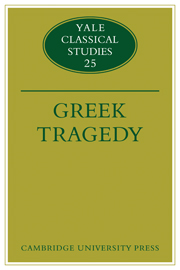Book contents
- Frontmatter
- Contents
- Introduction
- Septem contra Thebas
- The dissembling-speech of Ajax
- The tragic issue in Sophocles' Ajax
- Sophocles' Trachiniae: myth, poetry, and heroic values
- On ‘extra-dramatic’ communication of characters in Euripides
- The infanticide in Euripides' Medea
- The Medea of Euripides
- On the Heraclidae of Euripides
- Euripides' Hippolytus, or virtue rewarded
- Euripides' Heracles
- The first stasimon of Euripides' Electra
- Trojan Women and the Ganymede Ode
- The Rhesus and related matters
Introduction
Published online by Cambridge University Press: 10 January 2011
- Frontmatter
- Contents
- Introduction
- Septem contra Thebas
- The dissembling-speech of Ajax
- The tragic issue in Sophocles' Ajax
- Sophocles' Trachiniae: myth, poetry, and heroic values
- On ‘extra-dramatic’ communication of characters in Euripides
- The infanticide in Euripides' Medea
- The Medea of Euripides
- On the Heraclidae of Euripides
- Euripides' Hippolytus, or virtue rewarded
- Euripides' Heracles
- The first stasimon of Euripides' Electra
- Trojan Women and the Ganymede Ode
- The Rhesus and related matters
Summary
The articles in this volume are all literary studies of Greek tragedy.
As the best scholars of earlier generations have seen – Wilamowitz above them all – the full understanding of Greek tragedy by a modern demands the concerted techniques not merely of the literary critic, but also of the linguist, the metrician, the palaeographer, the philosopher, the historian, and the archaeologist. With this principle we agree entirely, adding only that perhaps there is yet another desirable qualification: to have lived a little; to have contemplated not books only, but also men and women, moral dilemmas, spiritual crises, and both the richness and the cruelty of life. Yet the conditions of human existence as such are unresearchable, at any rate by the techniques of professional scholarship; and there are plenty of classical journals available for the publication of articles on linguistics, metrics, and so forth. A volume on tragedy which was both to possess a certain unity and to interest a fairly wide circle of readers, classical and non-classical, had therefore best confine itself to the most commonly understood and easily communicable of those many approaches, literary criticism. Accordingly, on being asked by the Yale Department of Classics to edit this volume, we decided to invite contributions from a number of scholars whom we knew to be working on the literary criticism of Greek tragedy. As the project became known, several other scholars also submitted contributions.
- Type
- Chapter
- Information
- Greek Tragedy , pp. vii - xPublisher: Cambridge University PressPrint publication year: 1977



